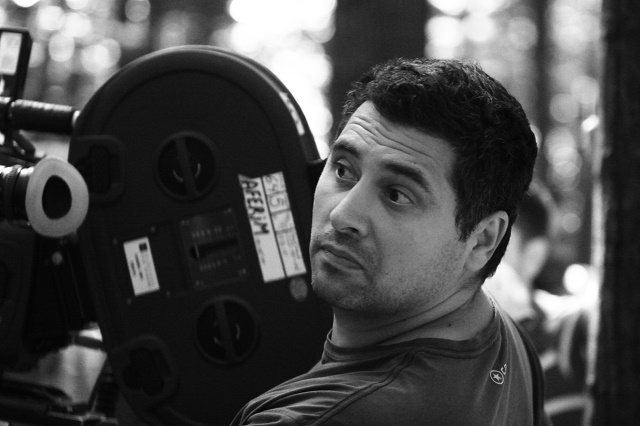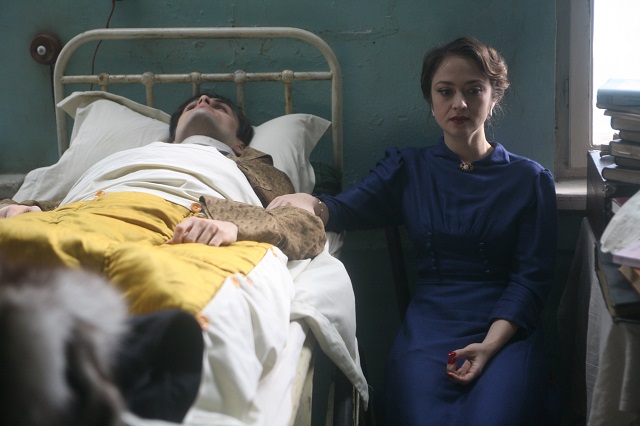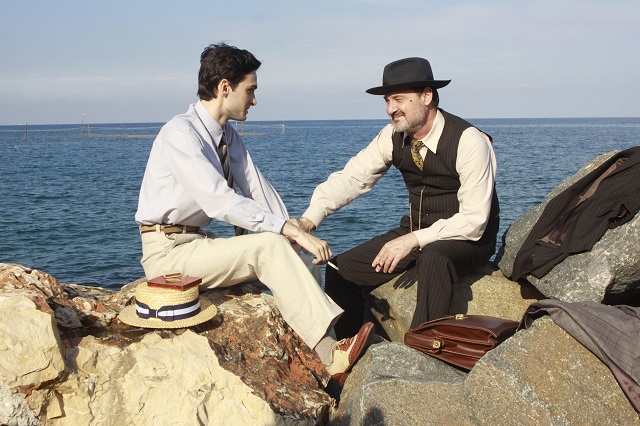
By focusing on stories of his country’s past in his two former films, Radu Jude stands out in Today’s Romanian cinema landscape. After the success of last year’s “Aferim!” his new film, “Scarred Hearts,” was presented in the Dare section of the 60th edition of the BFI London Film Festival. Set in a sanatorium for the wealthy in a Romanian seaside town in the thirties, it presents us with Emanuel, who suffers from spinal tuberculosis, leaving him in a cast recovering his torso and binding him to bed. Fighting the despair of illness with eccentricity and romance, he recites poetry or puts himself in awkward positions to pursue physical love. The film’s format and cinematography makes it a real aesthetic wonder, with a masterful use of light, colour and composition.
We met Radu Jude to ask him a few questions about the book adaptation, the visual style of the film, and the choice of Lucian Teodor Rus as the charming but doomed poet Emanuel.
By MAUREEN GUEUNET
(Roberawards)The film is loosely based on the novel of the same name of Max Blecher, why were you interested in this story, what drew you to it?
Well, there are many things… it’s less a film but more a homage to this book and to its writer Max Blecher that I really admire and who is not well known, not even in Romania. He was a Jewish Romanian writer from the thirties, who died very young. His novel and other two books of his are quite autobiographical, depicting his life as a sick young man who eventually died in a sanatorium. I think it’s important, this idea of the relationship with the sickness, the suffering, death. It’s important for me at least.
But also because it talks about the thirties. It is not the main topic but it is a little bit about the extreme right wing parties taking over the countries at this time, which is not a taboo in Romania but people don’t talk about it.
(Roberawards) What did you take from the book and what did you add yourself, how did you balance that?
It’s difficult to say. I took from the book the structure but I put some things of the author’s biography. I put aside some of the more romantic episodes of the book, they seemed very fake actually; and I added some things. It’s difficult to say what I did, but I think the main thing I kept is the theme, the main characters and the structure, and the rest comes from the book or from the research I’ve done.
The visual style is trying to reproduce the fact that he couldn’t really move…
Well it’s actually more because of my incompetence, because when we started to make the film I discovered I didn’t know how to do it. Because you know cinema means movement by definition and here the story is about somebody that doesn’t move and from the beginning I really didn’t know how to make the film. Little by little I thought maybe we should have very little movement. It’s not a big idea but I didn’t have another one.
Tell us about the ratio and how the corners are round…
That was an idea of the DoP that maybe we should keep this, and that we should keep the full frame, and that’s the way the image looks if you have it fully, if you don’t have the masks on. It was also to make it a bit artificial and to give the viewer this idea that the film is constructed in an artificial way.

And how did you work with the excerpts, it is interesting that sometimes you don’t even quote the whole sentence but a part of it…
Because I wanted to pay a homage to the literature and to this writer particularly, I decided to use at some point this literary text from the work of Max Blecher and to break the story. I didn’t choose them to fit the story, sometimes they fit with the story sometimes they don’t, but I searched the passages which I thought were more poetic and that had more poetry in them, I think they are beautiful. In a way, I am not an existentialist but Blecher was a kind of an existentialist and I wanted to emphasize this aspect, that’s why.
(Roberawards) How did you find Lucian Teodor Rus, the actor who plays Emanuel? He has this great romantic look and a very defined face, was it important for the story to have that kind of face or that kind of look?
Yes, I think he’s sensitive in a way and also a bit old fashioned in the way he looks. But it’s difficult to say that he was the perfect choice. If we would have chosen somebody that looked like an idiot, the story still would have worked, no?
(Roberawards) But you were happy with him, weren’t you?
I was very happy with him, I think he is very talented, very sensible.
‘Scarred Hearts’ screens at the London Film Festival on Sunday 16 October 2016, 17:00 h at Curzon Mayfair Cinema.

RT @RoberAwards: Our #LFF interview with Romanian auteur Radu Jude, who after his acclaimed ‘Aferim!’ returns with ‘Scarred Hearts’ https:/…